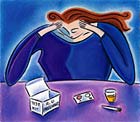Social Anxiety Disorder
Social Anxiety Disorder (social phobia) is the third largest mental health problem in the world. The latest government epidemiological data show social phobia affects over 7 percent of the population at any given time. The lifetime prevalence rate — the chances of developing social anxiety disorder at any time during the lifespan — stands at above 13 percent.  Anxiety is a normal reaction to stress. It helps a person deal with a tense situation at school or work or helps you study harder for an exam, and keeps you focused on an important situation. In general, it helps one cope. But when anxiety becomes an excessive, irrational dread of everyday situations, it has become a disabling disorder. There are five major types of anxiety disorders. They are:
Anxiety is a normal reaction to stress. It helps a person deal with a tense situation at school or work or helps you study harder for an exam, and keeps you focused on an important situation. In general, it helps one cope. But when anxiety becomes an excessive, irrational dread of everyday situations, it has become a disabling disorder. There are five major types of anxiety disorders. They are:
- Generalized Anxiety Disorder
- Obsessive-Compulsive Disorder (OCD)
- Panic Disorder
- Post-Traumatic Stress Disorder (PTSD)
- Social Anxiety Disorder (Social Phobia)
Social anxiety is defined as: the fear of social situations that involve interaction with other people. This includes the fear and anxiety of being judged and evaluated by other people. Social anxiety is often mixed up with panic disorder. People with social anxiety do not experience panic attacks.
Social anxiety disorder, also called social phobia, involves overwhelming anxiety and excessive self-consciousness in everyday social situations. People with social phobia have a persistent, intense, and chronic fear of being watched and judged by others and being embarrassed or humiliated by their own actions. Social phobia can severely disrupt normal life, interfering with school, work, or social relationships. While many people with social phobia recognize that their fear of being around people may be excessive or unreasonable, they are unable to overcome it. They often worry for days or weeks in advance of a dreaded social situation. The dread of a feared event can begin weeks in advance and be quite debilitating.
Social phobia can be limited to only one type of situation — such as a fear of speaking in front of others as in formal or informal situations. Fear of eating, drinking, or writing in front of others — or, in its most severe form, may be so broad that a person experiences symptoms almost anytime they are around other people. Social phobia can be very debilitating — it may even keep people from going to work or school on some days. Many people with this illness have a hard time making and keeping friends.
 Physical symptoms often accompany the intense anxiety of social phobia and include: nervousness, blushing, profuse sweating, trembling, racing heart, nausea, dry mouth and throat, and difficulty talking. If you suffer from social phobia, you may be painfully embarrassed by these symptoms and feel as though all eyes are focused on you. You may be afraid of being with people other than your family.
Physical symptoms often accompany the intense anxiety of social phobia and include: nervousness, blushing, profuse sweating, trembling, racing heart, nausea, dry mouth and throat, and difficulty talking. If you suffer from social phobia, you may be painfully embarrassed by these symptoms and feel as though all eyes are focused on you. You may be afraid of being with people other than your family.
People with social phobia are aware that their feelings are irrational. Even if they manage to confront what they fear, they usually feel very anxious beforehand and are intensely uncomfortable throughout. Afterward, the unpleasant feelings may linger, as they worry about how they may have been judged or what others may have thought or observed about them.
 Social phobia affects about 5.3 million adult Americans. Women and men are equally likely to develop social phobia. The disorder usually begins in childhood or early adolescence and there is some evidence that genetic factors are involved. Social phobia often co-occurs with other anxiety disorders or depression. Substance abuse may develop in individuals who attempt to “self-medicate” their social phobia by drinking or using drugs to alleviate their symptoms. Social phobia can be treated successfully with carefully targeted psychotherapy or medications.
Social phobia affects about 5.3 million adult Americans. Women and men are equally likely to develop social phobia. The disorder usually begins in childhood or early adolescence and there is some evidence that genetic factors are involved. Social phobia often co-occurs with other anxiety disorders or depression. Substance abuse may develop in individuals who attempt to “self-medicate” their social phobia by drinking or using drugs to alleviate their symptoms. Social phobia can be treated successfully with carefully targeted psychotherapy or medications.
Therapy: Cognitive behavioral therapy for social anxiety has shown to be successful. Thousands of research studies now indicate that after cognitive behavioral therapy, people with social anxiety disorder report a changed life — one that is no longer controlled by fear and anxiety. The National Institutes of Mental Health funded studies report a very high success rate using cognitive therapy and a behavioral therapy group. Both are essential to alleviating anxiety symptoms associated with this disorder.Medication: Social anxiety medication is useful for many people, and psychologists and therapists should work with the persons’ medical doctor and/or psychiatrist if at all possible. For cases of generalized social anxiety, research indicates use of the anti-anxiety agents, and certain antidepressants in conjunction with behavioral therapy has proven most beneficial. As to antidepressants, the MAOIs have the highest success rate when combined with cognitive behavioral therapy. Medication without cognitive behavioral therapy has proven to be only temporarily helpful.
Treatment Specialties: Social anxiety, as well as the other anxiety disorders, can be successfully treated. In seeking help for this problem find a a specialist; someone who understands this problem well and knows how to treat it. (Source: National Institute of Mental Health)
![]() Get Information on PureCalm for Anxiety & Panic Attacks . One Reader with panic attacks gave it a great review. It really works for her when other medications did not.
Get Information on PureCalm for Anxiety & Panic Attacks . One Reader with panic attacks gave it a great review. It really works for her when other medications did not.
![]()
Some Resources on the Web:
The Social Anxiety Institute SPSAA – Social Phobia/Social Anxiety Association.
